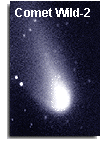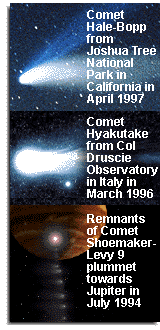|
WHY WILD-2?
Comet Wild-2 makes an excellent candidate for NASA's Stardust
mission because:
  It
is a short-period comet that returns to the sun every few
years and offers more opportunity for study. It
is a short-period comet that returns to the sun every few
years and offers more opportunity for study.
 It
is new to the inner solar system, which means it is in pristine
condition. Because most of Wild-2's life was spent in the icy,
distant reaches of the solar system, far from the sun's vaporizing
warmth, it should have lost little of its original material. It
will have passed the sun only five times by the date of encounter
with Stardust. In contrast, Comet Halley has passed the sun more
than 100 times. It
is new to the inner solar system, which means it is in pristine
condition. Because most of Wild-2's life was spent in the icy,
distant reaches of the solar system, far from the sun's vaporizing
warmth, it should have lost little of its original material. It
will have passed the sun only five times by the date of encounter
with Stardust. In contrast, Comet Halley has passed the sun more
than 100 times.
 It
will be in the right place at the right time to allow Stardust
to collect samples successfully. It
will be in the right place at the right time to allow Stardust
to collect samples successfully.
 Comet
Sightings Comet
Sightings
Wild-2 makes a better study subject than any of these other comets
that have been sighted recently:
 Comet
Hale-Bopp, spring 1997: Large comet, about 25 miles in diameter,
was the brightest comet since Comet West in 1976. Comet
Hale-Bopp, spring 1997: Large comet, about 25 miles in diameter,
was the brightest comet since Comet West in 1976.
 Comet
Hyakutake, spring 1996: Small comet that flew unusually close
to Earth had one of the longest tails ever observed. Comet
Hyakutake, spring 1996: Small comet that flew unusually close
to Earth had one of the longest tails ever observed.
 Comet
Shoemaker-Levy 9, summer 1994: Breaking into 21 pieces, it
put on a spectacular show when each fragment crashed into Jupiter. Comet
Shoemaker-Levy 9, summer 1994: Breaking into 21 pieces, it
put on a spectacular show when each fragment crashed into Jupiter.
|
|



